Year in Industry helps two students set the stage for science careers
Each year, the Earlham Institute offers undergraduate students a place on our Year in Industry programme.
These placements provide students with an opportunity to develop valuable scientific and professional skills and experience that will enhance their career opportunities. They may even help steer them towards (or rapidly away from) a future PhD application.
We asked our most recent Year In Industry students about their projects and experiences, as well as what they plan to do next.
Santa Walker (left) came to the Earlham Institute from the University of Aberdeen and Angel Chandwani (right) joined us from Nottingham Trent University.
What did you learn during your placements?
Santa: So much!
I started my year in industry with no experience in bioinformatics and very limited wet lab experience due to the pandemic. Given that my project depended on both, as well as fieldwork, I developed skills from the ground up across all three areas as well as gaining many other core research skills.
I took advantage of training opportunities at the Institute and across Norwich Research Park, such as the Software and Data Carpentry workshops which allowed me to further my abilities across various programming languages and tools. I also took courses on public speaking, artificial intelligence and machine learning.
Alongside my research project, I got involved in pretty much everything I could. I undertook some work experience with the Institute’s Business Development and Impact (BDI) team, where I delved into event organising, workshop planning, and market analysis.
I learnt all things public engagement and communicating science with a variety of audiences through Pint of Science, the Norwich Science Festival, the Royal Norfolk Show, Sci Comms East conference, school-level outreach such as the Top Class in Science competition, and attending a Sense about Science workshop on public discussions of science and policy.
Finally, I got an unparalleled insight into what research is like ‘in the real world’ and learnt all about undertaking a PhD.
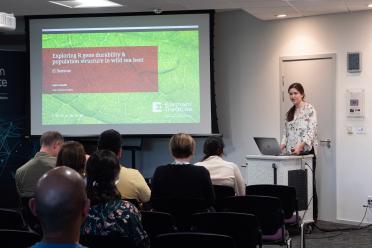
Angel: Prior to my placement year, I had multiple opportunities to develop lab skills. During the placement I got the opportunity to choose an entirely computational project which equipped me to learn and become competent at programming languages such as Linux command line and Python.
In terms of professional skills, the weekly meetings with my line manager, supervisor and group leader really allowed me to work on my ability to communicate scientific content in a concise manner.
Something I really appreciate, which I picked up from my manager, is how to make the most effective use of meetings through small things like setting an agenda before the meeting - it allows one to ensure that all necessary discussions are done within the timeframe.

I think, in terms of experience, just the overall ambience. When you see all scientists of various nationalities and cultures thriving together and collaboratively working towards a common goal in a group, it is breath-taking.

Angel Chandwani
What was your best experience here - and why?
SW: The highlight of my time at EI was without a doubt volunteering at the Norwich Science Festival. I had been looking forward to it for over a year, prior to even moving to Norwich, and yet it totally exceeded my expectations.
Sparking the next generation’s interest in science is so important and rewarding, and it was really inspiring to see the huge community of people passionate about doing this in Norfolk!
I particularly enjoyed engaging with the youngest members of the public - their wonder and enthusiasm really highlighted how much these outreach activities matter.
The cherry on top was hearing the feedback the Institute received, as well as seeing Rebecca Osborne’s beautiful graphic recordings of attendee feedback – my favourite responses being “DNA is like a secret code” and “we felt excited like an excited scientist”!
AC: I think, in terms of experience, just the overall ambience. When you see all scientists of various nationalities and cultures thriving together and collaboratively working towards a common goal in a group, it is breath-taking.
The unexpected moments where your ideas just coherently come together to solve a problem at hand was the best experience during my placement. This is because these moments really make you realise the true joy and magic of being a researcher.
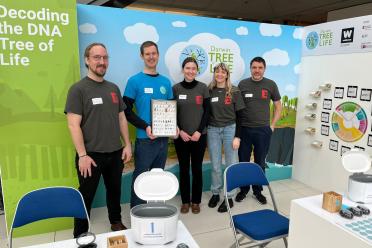
Santa with colleagues at the Norwich Science Festival
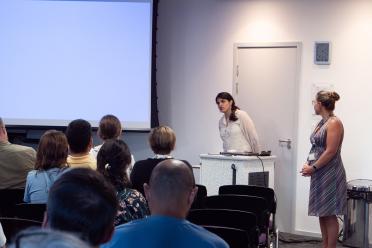
Angel presenting her research at the weekly seminar
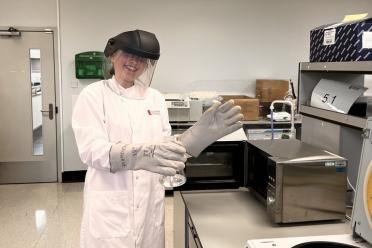
Safety first in the lab!

I started my year in industry with no experience in bioinformatics and very limited wet lab experience due to the pandemic. Given that my project depended on both, as well as fieldwork, I developed skills from the ground up across all three areas as well as gaining many other core research skills

Santa Walker
Where do you see yourself working – and has your experience here changed that for you?
SW: I am not entirely sure yet. My time at the Institute has introduced me to so many different possibilities in science – from research to BDI, science communication and science policy – that deciding what to pursue is very difficult!
I absolutely loved computational research, so I would definitely like to continue down that route, possibly venturing into AI or machine learning next. Furthermore, my time at the Institute has consolidated both my desire to undertake a PhD and my interest in public engagement and policy, in which I will definitely remain involved in the future.
AC: I see myself working as a researcher in the field of computational biology. While studying bioinformatics as part of some modules at University I did realise very early on that this was a field I am interested in. However, there was a block in my head - I thought I was incapable of coding and had a lack of computing skills.
The year at the Institute has not only increased my confidence but also helped me lay a strong foundation in my computational skills.
Applications open in October for our next Year in Industry cohort (Academic Year 2024-25). Visit our Year in Industry page to find out more.
What’s next for you?
SW: Back to Scotland for my final year at the University of Aberdeen, which will include some honours courses, an honours project, and final exams – as well as some PhD applications along the way! Also lots of hiking in the Highlands and then a trek across the Pyrenees as a graduation adventure.
After that – who knows?
AC: At the end of the placement, I will go back to university and work towards my research project and thesis writing which will mark the end of my degree.
Following this, I intend to apply for research assistant positions in the field of computational biology. My year at the Earlham Institute has only strengthened my desire to do research and I intend to apply for a PhD in the coming academic year.
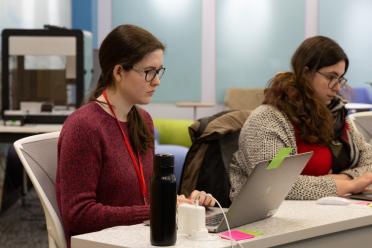

I absolutely loved computational research, so I would definitely like to continue down that route, possibly venturing into AI or machine learning next. Furthermore, my time at the Institute has consolidated both my desire to undertake a PhD and my interest in public engagement and policy, in which I will definitely remain involved in the future.

Santa Walker
Any advice for future Year in Industry students?
SW: (1) take advantage of as many opportunities as you can! This is the time to try many different things (particularly those outside your comfort zone) in an incredibly supportive environment!
And (2) talk to everybody and learn as much as possible about the amazing range of science at the Earlham Institute!
AC: To all the future Year in Industry students, I would like to say the placement at the Institute is like experiencing a mini-PhD. There might be instances where your project might not go according to plan and you might need to do some trouble-shooting to solve the problem at hand. This all can seem a bit daunting especially if you are new to research.
But it is essential to understand that the whole point of research is to explore the unknown and it is okay not to know what to do next. What is important is having a sense of curiosity, a can-do attitude and enjoying research for the sheer joy of doing it.

Following this, I intend to apply for research assistant positions in the field of computational biology. My year at the Earlham Institute has only strengthened my desire to do research and I intend to apply for a PhD in the coming academic year.

Angel Chandwani
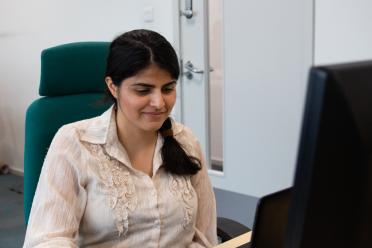
Learning computational skills was a highlight for Angel
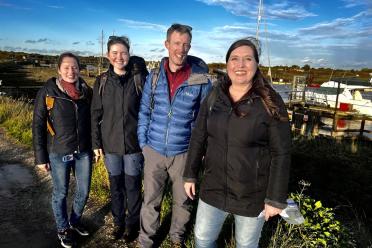
Santa with lab colleagues collecting samples of sea beet
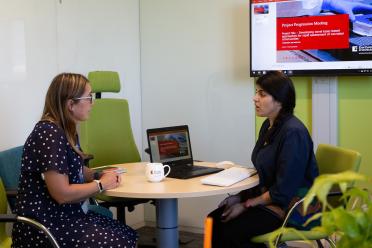
Angel with Head of Advanced Training, Emily Angiolini